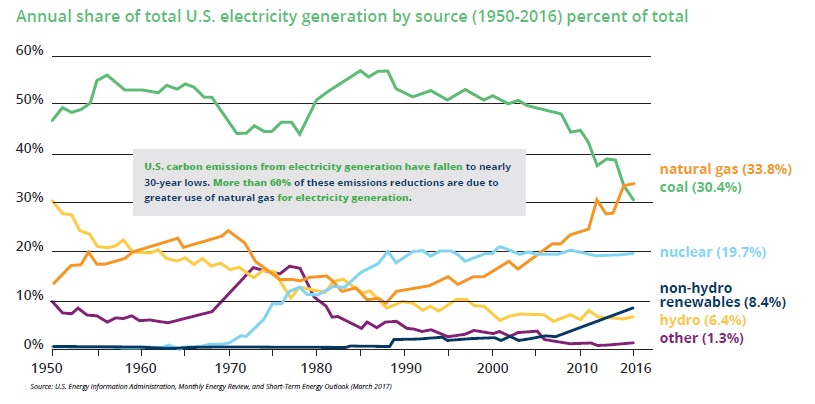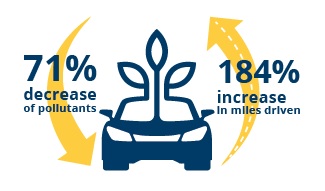Energy and Communities: Highlighting Industry Core Values and Community Engagement
Kate Lowery
Posted June 1, 2017
Today, API releases a new report that highlights the tangible ways our industry protects the safety and environment – as it also helps local communities. It’s an important document, reflecting the premium placed on responsible energy development by natural gas and oil companies. From the report:
The safety, health and protection of people, the environment and communities are the top priorities for the natural gas and oil industry. Today, natural gas and oil not only power our lives, but are the building blocks for so many of the products that make modern life possible. But this energy and the amazing things derived from it – everything from clothing and cosmetics to state-of-the-art health care devices and medicines – aren’t possible unless responsible development is the centerpiece of everything the industry does.
Among highlights from the report:
Standards – Nearly 700 API standards cover all industry segments – many of them adopted into regulations at the state and federal level:

Worker safety – The injury and illness rate for the U.S. natural gas and oil industry fell 45 percent from 2006-2015 at the same time new jobs were added, and industry’s rate is well below the national average for the entire U.S. private sector:

Pipeline safety – U.S. pipelines have a strong safety record, moving 99.99 percent of crude oil and petroleum products safely to their destination in 2016:

Similarly, in 2016, more than 99.99 percent of natural gas moved safely through interstate pipelines. In short, pipelines are incredibly safe – and getting safer all the time. In 2016, 25.3 trillion cubic feet of product moved through 300,000 miles of transmission pipes (200,000 interstate and 100,000 intrastate) plus 2.1 million miles of smaller lines that distribute gas to homes and businesses.
Reduced emissions – Between 1990 and 2015, methane emissions from natural gas systems dropped 16.3 percent overall and 59 percent from hydraulically fractured natural gas wells – at a time when natural gas use by the electric power sector rose almost 200 percent. U.S. energy-related greenhouse gas emissions are now at their lowest level in nearly 25 years. Natural gas now is the leading fuel source for generating electricity:

Refining sector advances – Modern, versatile refineries are producing cleaner gasoline and diesel fuels – which, combined with more fuel-efficient vehicles, have helped reduce U.S. air pollutants by 71 percent between 1970 and 2015. This has occurred even as vehicle miles traveled increased more than 184 percent.

The report also details advances in prioritizing responsible energy development, groundwater protection and well-casing standards, stewardship and reclamation efforts, protection of habitats, industry transparency and accountability, effective waste management and community engagement. Marty Durbin, API executive vice president and chief strategy officer, discussed the report during a conference call with reporters:
“The U.S. natural gas and oil industry is committed to producing more energy while reducing our footprint and improving the efficiency and safety of our operations. Investments in innovative technologies and operational improvements make it possible to lead the world not only in production and refining of oil and natural gas but also in reduction of carbon emissions – all while enhancing energy security and generating major economic benefits.”
America’s energy renaissance has changed our country’s energy narrative from one of scarcity to one of abundance – helping grow our economy, increase U.S. energy security, improve air quality and lower costs for consumers. Responsible natural gas and oil development is at the heart of these positive impacts. And, as this new report shows, industry is working to make the investments and develop the technologies to make continuous improvements. Durbin:
“America’s natural gas and oil industry provides the affordable, reliable energy that is the lifeblood of our economy, and we understand that the nation’s prosperity fundamentally relies on our industry’s ability to produce more of these resources in a way that promotes safety, benefits our communities and values environmental stewardship.”
About The Author
Kate Wallace is an associate of research and content development for the American Petroleum Institute. Before joining API she was a researcher and policy analyst at America’s Natural Gas Alliance, and worked on pollinator conservation programs and state wildlife conservation policies before entering the energy industry. Kate graduated from the University of Connecticut with a bachelor’s degree in Resource Economics, and earned her Master of Public Administration from George Mason University. She loves taking her dogs on hikes, travelling and navigating the northern Virginia/DC craft beer and wine scenes with her friends and family.


